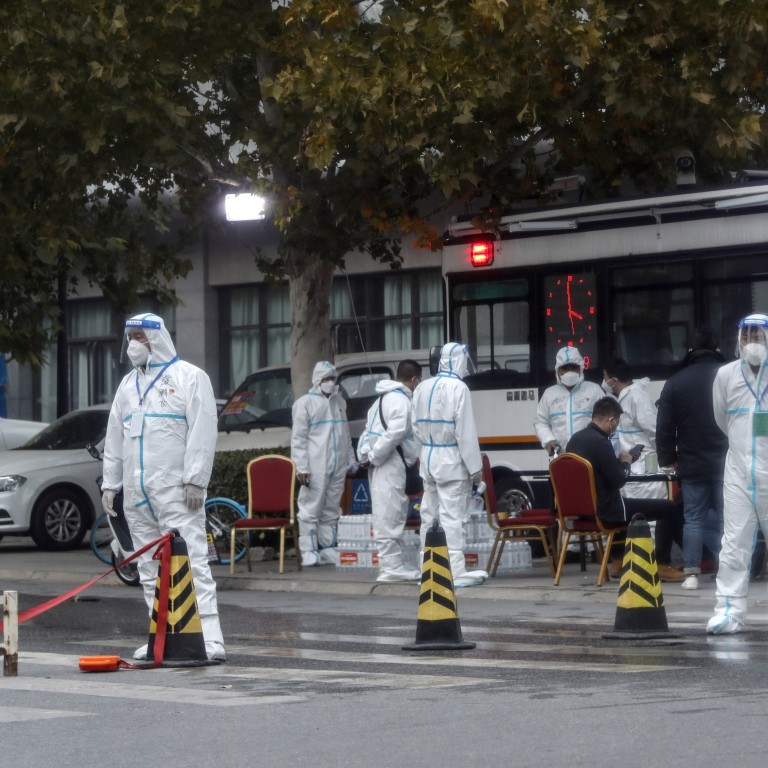
China reaped big health benefits from early Covid-19 lockdowns, researchers say
- Roughly 347,000 non-coronavirus deaths might have been prevented in 7 months, more than half from cardiovascular diseases, study finds
- Contributing factors include better air quality, and less traffic and occupational stress
In findings published in the peer-reviewed journal Nature on Monday, the team said lockdowns might have prevented an estimated 347,000 deaths in the first seven months of last year in the country, with about 60 per cent the lives saved from cardiovascular diseases.
The researchers said cleaner air from less traffic and industrial activities, habits such as wearing masks, hand hygiene and social distancing, and fewer traffic accidents could have contributed to the lower death toll from causes not related to Covid-19.
“Given the increasingly heated debates regarding different counter-Covid-19 policy choices around the world, our results provide a benchmark to understand the broader health consequences of strict anti-contagion policies,” they said, referring to lockdowns.
The study was conducted by researchers from the Chinese Centre for Disease Control and Prevention, including its director George Gao Fu; Peking University; Hong Kong University of Science and Technology; and the University of Hong Kong.
The paper was published just days after the new coronavirus variant Omicron was identified by the World Health Organization as a variant of concern.
Cases have been reported around the world, with Australia, Japan and Réunion of France reporting their first infections on Tuesday.
The WHO said it recognised that at certain points, some countries had no choice but to issue stay-at-home orders and other measures, to buy time.
The UN agency said governments must make the most of the extra time granted by lockdown measures to improve their ability to detect, isolate, test and care for all cases; and trace and quarantine all contacts.
Global risk from Omicron coronavirus variant very high, WHO says
The health official said mainstream tests would be able to detect any cases, and the country’s zero-Covid response will block community transmission.
China has maintained a zero-tolerance policy towards cases, deploying mass testing, frequent contact tracing, lengthy quarantines and strict border controls.
On Tuesday, Chinese foreign ministry spokesman Zhao Lijian said the country was determined to hold a successful Winter Olympics in February despite the challenges posed by Omicron.
WHO pulls together international experts to understand Omicron variant
But China’s tough control measures have drawn criticism, with some experts urging Beijing to adopt a more relaxed strategy and learn to live with the virus.
In the Chinese lockdown impact study, the team said the “results stand in contrast to the suggestion that [lockdowns] could increase mortality via increasing economic stress or limiting access to non-Covid-19-related medical care”.
“It has been suggested that measures such as lockdowns could harm overall population health in the short term because human mobility restrictions would reduce access to healthcare services, and business restrictions might lead to sharp economic disruption and massive lay-offs,” they said.
“In fact, our analyses show positive health impacts of [lockdowns], at least in China and in the short and medium term.”
Using death registries based on 300 million Chinese people, they found that lockdowns in early 2020 reduced non-Covid-19 mortality by 4.6 per cent outside Wuhan, where the coronavirus was first detected.
The study focused on deaths not related to Covid-19 and the team said they were unable to look at the effect on morbidity due to lack of data, especially for people who experienced non-Covid-related illness but avoided hospitals due to overcrowding or fear of catching Covid-19.
“We observed fewer deaths from cardiovascular diseases, traffic accidents, and acute and chronic lower respiratory infections during the period of [lockdowns]. These health benefits persisted into the post-lockdown period,” they said.
In the four months from April 8, 2020, when the lockdown was lifted in Wuhan, to July 31, the number of deaths fell by 12.5 per cent, according to the study.
They said a large decline in deaths from infectious diseases was most likely driven by behaviours to avoid Covid-19 infections, including wearing face masks, frequent hand sanitising and washing, and less physical interaction.
Improved air quality was likely why fewer people died from cardiovascular diseases, while less traffic, reduced occupational stress and changes in diet could explain public health benefits during the pandemic, they said.
But they said it was unclear if these benefits of reduced deaths would last beyond the study period of four months.
“It is possible that, for example, after more people get vaccinated, their health behaviors will revert back to the pre-pandemic norm,” they said. “It is also likely that, after economic production fully recovers, environmental quality will deteriorate and again threaten people’s lives.”
They said governments should find ways to sustain measures like practising good personal hygiene to retain health benefits after the pandemic.



